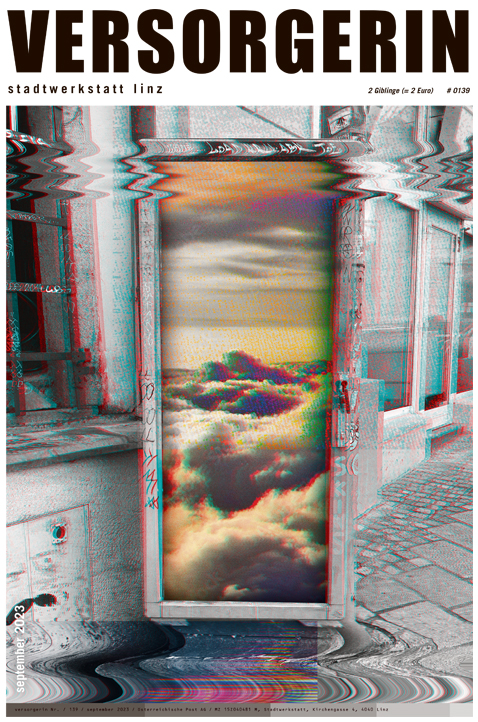As part of its 2023 cultural program, servus.at has reactivated its Artist Run Data Center (ARDC) residency format, a virtual residency program in which artists are invited to access the servus.at infrastructure and develop their projects in a series of virtual machines.
We invited Vo Ezn, a Netherlands-based infrastructure artist to be our first resident. Her project will be presented as part of STWST48x9 COLD HEAVEN, a parallel event to the Ars Electronica Festival program, organized and hosted at Stadtwerkstatt and can also be visited online.1
Vo Ezn (/vɔ ɪzn/) is a sound and infrastructure artist who works on many different projects, is part of feminist server collectives/networks and gives workshops hosted in her web-based && terminal environment. Her hands-on introduction to servers started during the second trimester
‘Special Issues’ while she was studying at the Masters program Experimental Publishing at the Piet Zwart Institute, Willem de Kooning Academy in Rotterdam. According to the theme of the course, she and her fellow students were »entrusted« to structure and securely host a fragile political archive, while at the same time finding a way to make the archive’s data (anonymously) available to the public. To do this, they were given a few Raspberry Pis, which they had to set up properly as web servers. The connection between Vo Ezn and that server was instantaneous. Although she had no prior knowledge of the hardware, as she describes, »I felt intrigued to con-figure out how it works. Generally, I am a hands-on person. I am curious how things work and at the same time I want to be able to modify and customize them freely in my own way. It is a learning process«. The final outcome of the course was the project »We have secrets to tell« that made available the resources and at the same time questioned issues of control over archival material and power structures within institutions.2
As an artist and member of various collectives working on feminist servers (systerserver/ anarchaserver/ minadoraserver), Vo Ezn believes that infrastructures are currently obfuscated by well established metaphors like »the cloud« and they could be more easily understandable, tangible and accessible. In accordance to that belief, she finds it very important to have her servers in her own home and to be able to work on them at any time. In her practice, she uses the ‘trial and error’ method as a learning process: »Things can break and that is fine. When I interact with my server and try things out, I do not know everything. I’m aware that through this process errors are bound to occur and I embrace failures as intriguing challenges and puzzles«. In contrast to the established – mostly corporate – mentality where everything should run perfectly 24/7 and where there is no room for failure or experimentation, Vo Ezn prefers to make infrastructures more explicit by doing things »to-for-by-with on her own terms« (as she likes to say) while working through her computer terminal.
Documentation plays a very important role in her practice: »A terminal session can last a very long time, but it only exists as long as I am running the terminal. If I close the terminal, there is no backup and you can no longer see the commands that have been executed. By adding a line of code in .bashrc on my computer, I can document the whole process output and keep each session in a log file. I use this method as one of the ways of documenting the workshop session; I publish the log files in their raw form. However approaches may differ at feminist servers, which are machines managed collectively following feminist principles, that »radically questions the conditions for serving and service«.3 For example, during the systerserver sessions it is extremely important to document everything in detail, especially for those who are not there and to be able to refer back to it in future. At the moment documentation is mostly available internally.
Through her practice, Vo Ezn focuses on and creates what she calls »introverted interfaces«, a term that offers a personal reflection on the layers of visibility/invisibility, availability and access to programming knowledge. Obfuscation is a common practice in software development, where programmers deliberately modify code so that it is fully executable and at the same time impossible for another person or computer to read. By turning everything into a black box, it limits accessibility and therefore doesn’t allow the dissemination and use of knowledge by the wider community. The result is a centralization of power. At first glance, an introverted interface may seem puzzling or mysterious, but it doesn’t try to hide anything, on the contrary: »It’s just that things aren’t in your face. You should stay there and find out how things work«.
Her website https://ezn.leverburns.blue is a good example of an introverted interface. At the first encounter, it doesn’t look like a typical website, and the user may feel confused, but as soon as she moves the cursor, parts of the text or symbols light up, and clicking on them reveals hyperlinks, images or text. There is no »linear« navigation, but rather an organic path that is unique for each visitor or visit. To find out how an introverted website works, users have to invest time and effort. »I make things very personal, I put so much work into it and maybe a visitor should stay a while to get to know it properly« says Vo Ezn. Minadoraserver (https://minadoraserver.art) is another example of an introverted interface, which at first seems even more encrypted. The name refers to Minadora Orjonikidze, a Georgian female politician and activist, who together with four other women, signed the Act of Independence of the Democratic Republic of Georgia. The collective behind this server consist of four women (Tekla, Nona, Mako and Vo Ezn) whose intention is to »… aspire to fire up emancipatory artistic tools and platforms in Georgia, and establish critical connections along the way«.
Minadoraserver hosts information mainly in Georgian, which may seem like a cipher to a standard user (who is mainly familiar with the Latin-based alphabet). However, if someone has the patience, time and curiosity to try out the things that appear on the screen, things will soon open up in front of them.
Vo Ezn is also part of the feminist server collectives systerserver and anarchaserver, whose practice are grounded in the thoughts of »A Feminist Server Manifesto«: a feminist server is a situated technology, that doesn’t separate network technology from the social reality. She is autonomous by deciding for her own dependencies, and she puts the conditions of serving and service under question, as well as the technology and its dependencies within the systems it is embedded in.4 A very important element of the community behind the feminist server is the trust among her members, in order to create a safe/r space that allows learning, experimenting and knowledge sharing within the above mentioned framework. Additionally, the community uses practices based on feminist principles, while the members of a server have a particular role related to system administration, care or maintenance. »A feminist server is nourished and flourished by the particular capacities of the people inhabiting it«, comments Vo Ezn, and she adds »proximity is also important. What I like about a feminist server is that it is tangible. You know where it is and the people behind it; this makes it more intimate and personal.«
Going back to introverted interfaces, part of Vo Ezn’s practice is to run (mainly online) workshops in Lever Burns, a no-camera and no-audio environment, where communication is possible only through text »That makes everyone feel comfortable and it works really well, especially for those for whom english is not their first language« she says. The workshops are hosted on her servers; one of the elements of the interface is a terminal, with direct access to the server, which means that participants can not only see it, but also interact with it or modify it. In a technical sense, this makes the space very vulnerable. This is one of the reasons, as Vo Ezn explains, »I invite participants through allied networks. They should know the session-dedicated link, which is not publicly shared, but I also make sure who enters. Nobody wants a tech bro energy!« Vo Ezn tries to create a space where everyone and everything feels comfortable, excited and has fun. Instead of giving commands, Vo Ezn wants the participants to suggest things and try them out together. Again, if something fails that’s o.k. and part of the learning process.
Vo Ezn’s project residency is a continuation of infraendeavours – this time in a servus.at server. In her VPS (Virtual Private Server), she chose to use Munin – a free and open source software which is monitoring the system for the correct maintenance of the server’s performance. Munin allows her to fetch and analyze data from other server VPSs in the servus.at infrastructure. According to Vo Ezn »By using this monitoring system, I cannot see the background processes that everyone is running, however I can get data related to – among others things – the load, the energy consumption or space usage. Since I am working in an experimental mode, I would try to visualize how these processes set the mood. The resulting prototypes engage with all of this and its introverted interface allows the viewer to experience the situatedness of that machine. It does not only visualize the status of the server, but also the mood of the server maintainer, as well as the config and the connection conditions of the visitor. Exploring the server to get to know its user(s).«
links:
https://hackersanddesigners.nl
AMRO Research Lab
The AMRO Research Lab consists of a series of events, including workshops, lectures and other activities related to artistic research, that takes place between the various editions of the AMRO Festival. It serves as a forerunner and think tank for the upcoming festival. The Research Lab is
characterised by a strong interdisciplinarity, combining critical theoretical reflections with the practical approach of the hacktivist community. https://research.radical-openness.org/
Save the date: the next AMRO Festival will take place from 8th-11th May 2024 in Linz. More information from late autumn on the website https://radical-openness.org/

